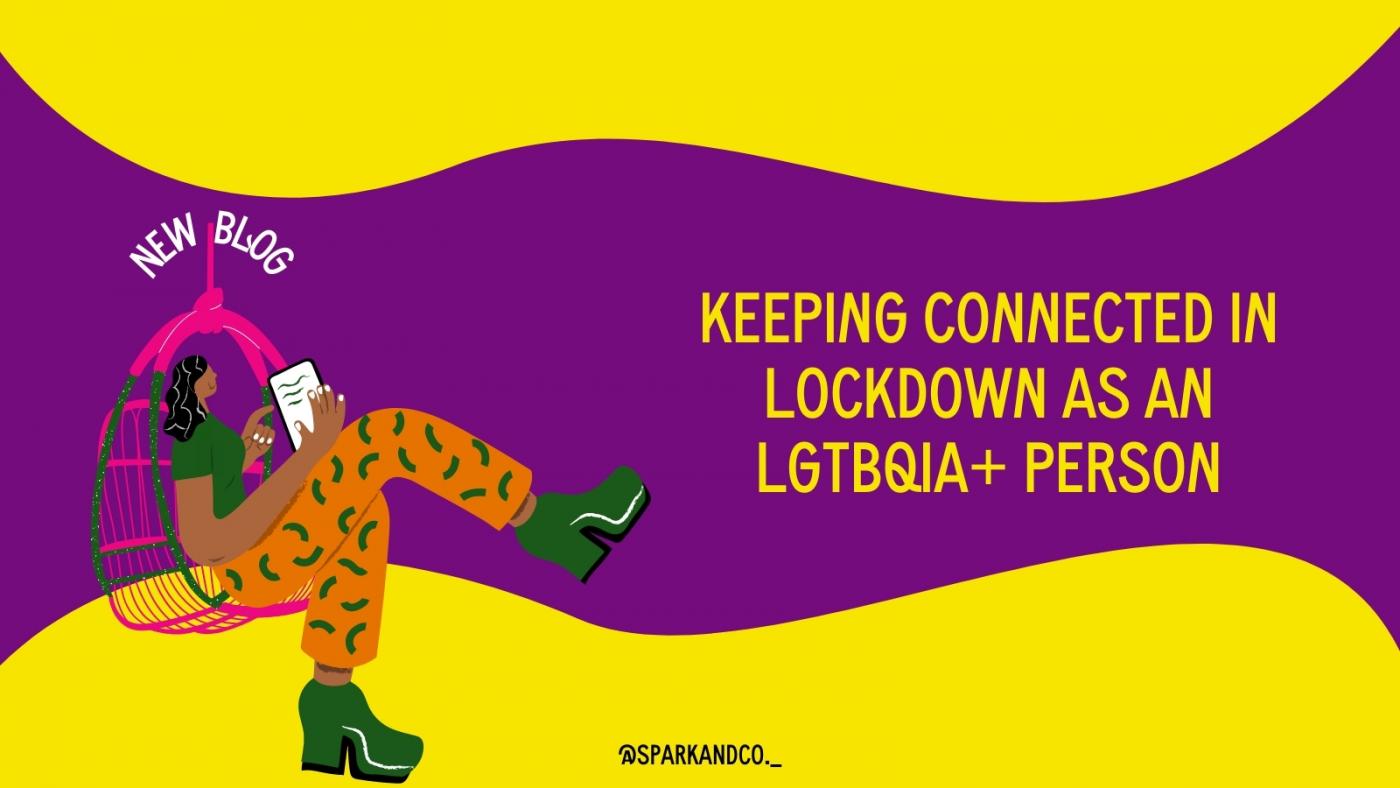Keeping Connected in Lockdown as an LGBTQIA+ Person

With nearly four in five LGBTQIA+ people stating that lockdowns have negatively impacted their mental health, how can LGBTQIA+ people stay connected during COVID-19?
Remaining social has proven important to everyone in 2020, but for queer people the need is especially great. As another potentially months-long lockdown approaches in 2021, and we hunker down to ride out the next peak in coronavirus cases, it’s important for LGBTQIA+ folks to think about staying connected.
LGBTQIA+ people are likely to share certain experiences that make isolation particularly damaging; hostile family relationships; anxiety and depression; alcohol and drug abuse; home insecurity; loneliness, violence and abuse - queer people are more likely than most to experience all of these things.
More generally, we also experience an ‘otherisation’ for which the most effective cure is community, care, and being around others like ourselves. The ‘family of friends’ is an old queer cliché, but that makes it none the less true. In a time when our inequalities are still great, queer communities are essential to our wellbeing.
For racialised queer people the situation is often more complicated. People from some racialised communities may find it difficult to come out, and may also experience racism from LGBTQIA+ people, the very place where acceptance is so vital. This is why staying connected with groups which provide the specific kind of intersectional support, especially during a time when people may be undergoing large amounts of stress, is vital.
Unfortunately, the current environment is making such connections difficult to maintain. Our community hubs have all but disappeared as pubs, clubs, and third sector organisations have closed their doors, or dramatically scaled-back face to face services. Many of us are now forced into compressed living situations with strangers, or family members who may, or may not, accept our sexual identity. We can’t see our friends, hear their laughter, or exist in spaces where our sexual identities are free to flourish, free of concerns about our safety.
A brief reprieve in the summer was a welcome chance for many of us to thrust our heads above water and gasp a few lungfuls of social contact, but for many in the UK, lockdowns have been fairly constant again since September. This seismic change to the lives of queer people is more than just inconvenient prolonged dislocation from our social habitats is causing a mental health crisis.
A survey of over 2,000 LGBTQIA+ people by LGBT HERO found that almost all indicators of mental distress increased dramatically during the first lockdown. Nearly four in five LGBTQIA+ people said that lockdown had negatively impacted their mental health. Regularly experienced depression increased by over fifty percent. Severe loneliness among queer people almost tripled. The picture of our mental health as a community is extremely concerning.
So what can you do as an individual to try and maintain your own mental health? While there are limits to what each person can do - it’s a pandemic, and sometimes we must accept that our capacity to create change is finite - we can at least try to preserve some of the connections which sustain us. Yes, we’re all sick to the back teeth of Zoom and Houseparty, but remaining in touch with your friends, or community groups, by any means is going to be good for you.
If you can, schedule that video chat, make that phone call, or send that meme of desperation on WhatsApp. Where possible, try going for a wintry walk with your friend, as long as current lockdown restrictions permit it. It’s important to acknowledge, however, that for some people these networks of friends aren’t accessible right now, which is why it’s also important to know where you can get support if you’re feeling lonely and isolated.
Below you’ll find a list of organisations that are keeping LGBTQ+ social through a variety of methods.
Some run helplines that are open throughout the year, others are still running community groups online, and some offer befriending schemes.
Switchboard - 0300 330 0630 (10am-10pm), chris@switchboard.lgbt
The UK’s longest-running LGBTQ+ helpline which is open 365 days a year. They’re here to chat about anything and everything, whether you’re lonely and need someone to talk to, or are looking for more local support.
LGBT Foundation - 0345 3 30 30 30, Monday to Friday, 10am-6pm
LGBTQ+ charity delivering a whole host of services to Greater Manchester and beyond. Its helpline is currently running extended hours, and its befriending service is still active. All services are now delivered remotely.
Birmingham LGBT - 0121 643 0821, hello@blgbt.org
The biggest provider of culturally competent LGBTQ+ services in the West Midlands, and is still running a large portion of its services online. It’s also hosting a virtual Christmas which anyone from across the country is free to join.
London Friend - office@londonfriend.org.uk
London Friend has been providing support to LGBTQ+ people for decades and is currently running an Lockdown Support Group for people who are feeling isolated.
If you're looking for further support
- Visit the mental health resource section on Spark & Co.'s Resource Hub
- Take a look at our LGBTQIA+ Resource Packs
This post was written by one of our Community Ambassadors, writer and LGBTQIA+ mental health advocate, Justin Mahboubian-Jones. Find out more about Justin here.
